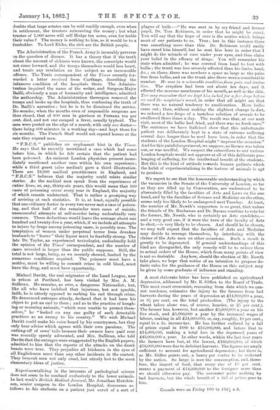A most elaborate letter has been published on agricultural depression,
addressed by Mr. R. Giffen to the Board of Trade. This most exact economist, reasoning from data which we can- not condense, estimates the injury to the farmers from bad harvests during the years of depression at 214,000,000 a year, or 61 per cent. on the total production. (The injury to the wheat taken alone was, of course, heavier, or 25 per cent.). The farmer has, however, lost another 25,000,000 a year on his live stock, and B5,000,000 a year by the increased wages of labour, making in all 224,000,000, or, say, roughly, 10 per cent., equal to a 2s. income-tax. He has further suffered by a fall of prices equal in 1880 to £16,000,000, and before that to 214,000,000, making a total loss in the depressed years of E43,000,000 a year. In other words, within the last four years the farmers have lost, at the lowest, 21604000,000, of which 256,000,000 were due to deficientharvests. The figures are amply sufficient to account for agricultural depression ; but there is, as Mr. Giffen points out, a heavy per contra to be reckoned by the nation. So large is now the consumption, and, there- fore, the import of food, that every rise of 10 per cent. means a payment of £14,000,000 to the foreigner more than we should otherwise pay. The consumer .gains nothing by bad harvests, but the whole benefit of a .fall of prices goes to him.






































 Previous page
Previous page